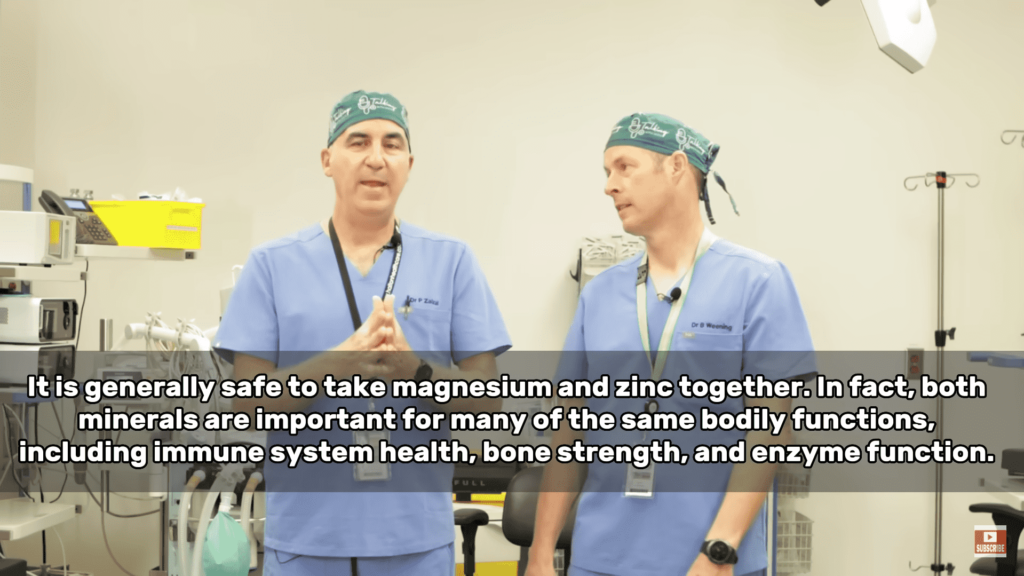Magnesium can help with arthritis by relieving muscle soreness and decreasing stress. Epsom salts and magnesium taurate are beneficial natural options for treating arthritis pain.
However, while magnesium can aid in treating inflammation and pain related to arthritis, it is unlikely to prevent or cure the condition. There is evidence suggesting that low magnesium intake is associated with worse pain and function in arthritis sufferers, and the combination of magnesium and probiotics may serve as a new avenue for the prevention and treatment of osteoarthritis.
Therefore, incorporating adequate magnesium intake may potentially provide some relief for individuals dealing with arthritis symptoms. It is important to note that magnesium plays a vital role in strengthening bones, maintaining nerve and muscle function, regulating heart rhythm, blood sugar levels, and joint health.

The Connection Between Magnesium And Arthritis
Effects Of Magnesium Deficiency On Joint Health
When the body lacks magnesium, it can lead to adverse effects on joint health. Magnesium deficiency may exacerbate inflammation and weaken bone density, contributing to the progression of arthritis. Moreover, it can impair the body’s ability to regulate calcium and vitamin D, which are crucial for maintaining healthy joints and bone structure.
Research Studies On Magnesium’s Impact On Arthritis Symptoms
Several research studies have investigated the impact of magnesium on arthritis symptoms, yielding promising results. A study published in the Osteoarthritis Cartilage journal revealed that low magnesium intake was associated with increased knee pain in individuals with radiographic knee osteoarthritis. Additionally, other research reports indicate that enhancing magnesium levels may alleviate inflammation and pain associated with arthritis, potentially reducing complications in the future.

Types Of Magnesium For Arthritis
Magnesium is a mineral that has been found to be beneficial in managing the symptoms of arthritis. There are various types of magnesium that can be used to alleviate arthritis-related discomfort and improve overall joint health. Understanding the different forms of magnesium and their specific benefits can help arthritis sufferers make informed choices about their treatment options.
Benefits Of Transdermal Magnesium For Muscle Soreness And Stress
Transdermal magnesium, absorbed through the skin, offers unique benefits for arthritis patients. It can aid in relieving muscle soreness and reducing stress, promoting overall relaxation and improved muscle function.
Magnesium Taurate: Amino Acid Combination For Arthritis Relief
Magnesium taurate combines magnesium with the amino acid taurine, making it an effective option for alleviating arthritis symptoms. This combination offers targeted relief for joint pain and inflammation, contributing to overall arthritis management.
Magnesium And Rheumatoid Arthritis
Magnesium plays a crucial role in combating the symptoms of rheumatoid arthritis, a chronic inflammatory disorder that affects the joints. Research suggests that magnesium supplementation may offer relief from pain and inflammation associated with rheumatoid arthritis.
Recommended Daily Magnesium Intake For Rheumatoid Arthritis
- Adults: Men 400-420mg, Women 310-320mg
- Pregnant Women: 350-360mg
- Breastfeeding Women: 310-320mg
Potential Anti-inflammatory Effects Of Magnesium
Magnesium exhibits anti-inflammatory properties that can help reduce the inflammation in the joints caused by rheumatoid arthritis. Studies suggest that magnesium supplementation may alleviate pain and improve joint function in individuals with rheumatoid arthritis.

Magnesium And Osteoarthritis
Studies suggest a potential link between magnesium intake and arthritis pain relief. Magnesium may help reduce inflammation and alleviate arthritis symptoms, showing promise in managing osteoarthritis discomfort. Consider incorporating magnesium supplements for potential relief from joint-related issues.
Association Between Low Magnesium Intake And Knee Pain In Osteoarthritis
Research has found a significant association between low magnesium intake and knee pain in individuals with osteoarthritis. A study conducted as part of the Osteoarthritis Initiative showed that those with radiographic knee osteoarthritis and low magnesium intake experienced increased knee pain. The findings suggest that maintaining adequate levels of magnesium could potentially help alleviate knee pain in osteoarthritis patients.
Exploring The Role Of Magnesium In Osteoarthritis Management
Magnesium plays a crucial role in various physiological processes in the body, including bone health and inflammation regulation. The use of magnesium for managing osteoarthritis has shown promising results in reducing inflammation, relieving pain, and potentially slowing down disease progression.
Studies have reported that low magnesium intake is associated with worse pain and function in individuals with arthritis, indicating the importance of maintaining sufficient magnesium levels for optimal joint health. Furthermore, the study found an association between magnesium intake and joint space narrowing in the knee, suggesting that magnesium supplementation may help alleviate symptoms related to joint space narrowing in osteoarthritis.
To summarize:
– Low magnesium intake is associated with increased knee pain in individuals with radiographic knee osteoarthritis.
– Magnesium plays a crucial role in bone health and inflammation regulation.
– Maintaining sufficient magnesium levels can potentially help alleviate pain and improve function in individuals with arthritis.
– Magnesium supplementation may help alleviate symptoms related to joint space narrowing in osteoarthritis.

Magnesium Supplements For Arthritis
Magnesium supplements can provide relief for arthritis by reducing inflammation and relieving muscle soreness. They are a natural option to treat the muscular component of arthritis pain and can help decrease stress. Additionally, there is strong evidence supporting the use of magnesium for treating arthritis-related inflammation and pain.
Magnesium supplements have gained attention as a potential treatment for arthritis-related inflammation and pain. While they may not prevent or cure arthritis entirely, there is strong evidence that supports the use of magnesium supplements to alleviate symptoms and reduce complications in the long term.
Pros And Cons Of Magnesium Supplements For Arthritis
Magnesium supplements offer several benefits for individuals with arthritis:
- Alleviates inflammation: Magnesium has anti-inflammatory properties that can help reduce swelling and pain associated with arthritis.
- Pain relief: By reducing inflammation, magnesium supplements can offer relief from joint pain.
- Improved joint function: Some studies have suggested that magnesium intake can improve joint function in individuals with arthritis.
- Reduced complications: Magnesium has been shown to reduce the risk of certain complications associated with arthritis, such as osteoporosis.
However, it is important to consider the potential drawbacks of magnesium supplements:
- Gastrointestinal issues: Some individuals may experience digestive discomfort, including diarrhea, when taking magnesium supplements.
- Drug interactions: Magnesium supplements can interact with certain medications, such as antibiotics and diuretics, so it is important to consult with a healthcare professional before starting magnesium supplementation.
Evaluating The Impact Of Magnesium On Arthritis-related Inflammation
Research has shown that magnesium supplementation can have a positive impact on inflammation associated with arthritis. Low magnesium intake has been found to be associated with worse pain and function in individuals with arthritis. On the other hand, increasing magnesium levels through supplementation has shown to alleviate inflammation and pain, as well as improve joint function.
Furthermore, a study found an association between magnesium intake and joint space in the knee, suggesting that magnesium may help with symptoms of joint space narrowing. Therefore, magnesium supplements can potentially play a helpful role in managing arthritis-related inflammation and its associated symptoms.
Magnesium’s Role In Alleviating Arthritis Symptoms
Arthritis can be a debilitating condition characterized by inflammation and joint pain. Recent studies have shown that magnesium plays a crucial role in alleviating arthritis symptoms and improving overall joint health. Let’s delve into how magnesium can help in managing arthritis effectively.
Analgesic Properties Of Magnesium In Pain Relief
Magnesium possesses analgesic properties that aid in pain relief for individuals suffering from arthritis. By reducing inflammation and blocking pain signals, magnesium can alleviate discomfort associated with arthritis.
Managing Arthritis Complications With Magnesium Supplementation
Supplementing with magnesium can assist in managing arthritis complications effectively. Magnesium aids in reducing inflammation, supporting joint health, and improving overall mobility for individuals with arthritis.

Magnesium And Joint Health
When it comes to joint health, magnesium plays a crucial role in supporting the body’s overall function. Magnesium is an essential mineral that contributes to bone health and supports the maintenance of joint function. Recent studies have highlighted the potential synergistic effects of magnesium in tandem with other elements, such as probiotics, in preventing osteoarthritis. Additionally, emerging research has shed light on magnesium’s potential to improve joint space in arthritis, offering hope for those seeking natural remedies for joint-related issues.
Synergistic Effects Of Magnesium And Probiotics In Osteoarthritis Prevention
Recent research has pointed to the potential synergistic effects of magnesium and probiotics in the prevention of osteoarthritis. Probiotics, known for their role in gut health and immune function, have been found to work in tandem with magnesium to support joint health. The combined impact of these two elements provides a promising avenue for osteoarthritis prevention.
Recent Findings On Magnesium’s Role In Improving Joint Space In Arthritis
Recent findings have unveiled the significance of magnesium in improving joint space in arthritis. Studies have indicated that adequate magnesium levels may contribute to maintaining healthy joint space and potentially alleviate symptoms related to joint space narrowing. These insights open the door to exploring magnesium as a natural remedy for improving joint health.
Vitamins And Minerals For Arthritis Management
Arthritis is a chronic condition that affects millions of people worldwide, causing pain, inflammation, and reduced mobility in the joints. While there is no cure for arthritis, proper management can help alleviate symptoms and improve quality of life. Vitamins and minerals play a crucial role in arthritis management, as they support bone health, reduce inflammation, and aid in muscle function. One such essential mineral is magnesium, which has been linked to several benefits for arthritis sufferers.
Importance Of Magnesium In Strengthening Bones And Muscle Function
Magnesium is vital for maintaining strong and healthy bones, making it particularly beneficial for individuals with arthritis. This mineral works in conjunction with other nutrients, such as calcium and vitamin D, to support bone density and reduce the risk of fractures. Additionally, magnesium plays a crucial role in muscle function, helping to relieve muscle tension and cramps commonly experienced by arthritis patients. By ensuring an adequate intake of magnesium, individuals with arthritis can support their overall bone and muscle health, thereby mitigating some of the symptoms associated with the condition.
Role Of Magnesium In Regulating Heart Rhythm And Blood Sugar Levels
In addition to its impact on bone and muscle health, magnesium also plays a key role in regulating heart rhythm and blood sugar levels. Arthritis patients often face an increased risk of cardiovascular complications and diabetes, making the role of magnesium even more significant. Magnesium helps maintain a steady heart rhythm, reducing the likelihood of arrhythmias and other cardiac issues. Furthermore, this mineral assists in the regulation of blood sugar levels, which is essential for managing diabetes, a condition that can coexist with arthritis. By incorporating sufficient magnesium into their diet, individuals with arthritis can potentially mitigate the risk of these comorbid conditions.
Magnesium Supplements: Myths And Realities
Magnesium supplements are often touted as a natural remedy for various health conditions, including arthritis. However, there are several myths and misconceptions surrounding the use of magnesium supplements. It’s essential to separate fact from fiction when considering whether magnesium supplementation can truly help with arthritis.
Dispelling Misconceptions About Magnesium Supplements
One common myth is that all magnesium supplements are created equal. In reality, there are different forms of magnesium, each with its own absorption rate and potential benefits. For arthritis, certain forms of magnesium, such as magnesium citrate or magnesium glycinate, may be more effective due to their ability to reduce inflammation and support joint health.
Identifying Potential Risks Associated With Magnesium Supplementation
While magnesium supplements can offer benefits for arthritis sufferers, it’s crucial to be aware of potential risks. Excessive magnesium intake can lead to digestive issues, such as diarrhea, and may interact with certain medications. Consulting with a healthcare provider before starting magnesium supplementation is advisable to avoid any adverse effects.

Magnesium-rich Diet For Arthritis Relief
Arthritis can be a debilitating condition that affects the joints and causes pain and inflammation. While there is no cure for arthritis, certain lifestyle changes, including dietary modifications, can help alleviate symptoms and improve joint health. One such dietary change is incorporating magnesium-rich foods into your arthritis diet plan.
Incorporating Magnesium-rich Foods In Arthritis Diet Plan
Magnesium is an essential mineral that plays a crucial role in maintaining joint health. It helps reduce inflammation, relaxes muscles, and supports bone density. Therefore, consuming foods rich in magnesium can promote arthritis relief. Here are some magnesium-rich foods you can include in your arthritis diet plan:
- Green leafy vegetables such as spinach and kale
- Nuts and seeds like almonds, sunflower seeds, and flaxseeds
- Whole grains such as brown rice and quinoa
- Legumes such as beans and lentils
- Seafood, including salmon and mackerel
- Avocados
Incorporating these foods into your diet will not only provide you with essential magnesium but also other beneficial nutrients that can support joint health and reduce arthritis symptoms.
Balancing Magnesium Intake For Optimal Joint Health
While consuming magnesium-rich foods is important, it’s also crucial to maintain a balance in your magnesium intake. It’s recommended to get magnesium from a combination of dietary sources and supplements, if necessary. Consulting with a healthcare professional or a registered dietitian can help determine the appropriate magnesium intake for your specific needs.
It’s worth noting that excessive magnesium intake may lead to digestive issues. Therefore, it’s essential to follow the recommended daily allowance for magnesium and avoid excessive supplementation without professional guidance.
Incorporating a magnesium-rich diet into your arthritis relief plan can provide numerous benefits for joint health. By including foods such as leafy greens, nuts, whole grains, and legumes, you can increase your magnesium intake and potentially reduce inflammation and pain associated with arthritis.
Practical Tips For Increasing Magnesium Absorption
Increasing magnesium absorption is crucial for individuals with arthritis. Magnesium taurate, Epsom salts, and transdermal magnesium oil are practical options for improving magnesium levels, reducing muscle soreness, and alleviating arthritis symptoms. These methods can help enhance joint health and promote overall well-being.
Optimizing Magnesium Absorption Through Dietary Choices
Incorporating magnesium-rich foods into your diet is an effective way to increase magnesium absorption. Here are some practical tips:
- Include dark leafy greens such as spinach and kale in your meals.
- Consume nuts and seeds like almonds, pumpkin seeds, and sunflower seeds.
- Incorporate whole grains such as quinoa, brown rice, and oats.
- Include legumes like black beans, chickpeas, and lentils in your diet.
- Choose fatty fish like salmon and mackerel, which are not only excellent sources of omega-3 fatty acids but also contain high levels of magnesium.
- Consider adding avocados to your meals as they are not only delicious but also packed with magnesium.
Enhancing Bioavailability Of Magnesium Supplements
If you prefer taking magnesium supplements, consider these tips to enhance the bioavailability:
- Look for chelated magnesium supplements, such as magnesium citrate or magnesium glycinate, which are more easily absorbed by the body.
- Take magnesium supplements with meals to improve absorption.
- Avoid taking magnesium supplements with high fiber foods or medications that can interfere with absorption.
- Divide your magnesium supplement doses throughout the day for better absorption.
- Stay hydrated as proper hydration supports mineral absorption, including magnesium.
By incorporating these practical tips into your routine, you can optimize magnesium absorption and potentially reap the numerous benefits for managing arthritis symptoms.
Personal Stories: Magnesium Success In Arthritis Management
Discover the role of magnesium in effective arthritis management through personal success stories. Magnesium offers relief by reducing muscle soreness and stress, making it a beneficial option for arthritis sufferers. Explore how different forms of magnesium, like Epsom salts and magnesium taurate, can alleviate arthritis-related inflammation and pain, enhancing overall joint health.
Real-life Experiences Of Arthritis Patients Using Magnesium Therapy
Magnesium has been a game-changer for many arthritis sufferers, providing relief and improved quality of life. Let’s delve into some personal stories that highlight the effectiveness of magnesium in managing arthritis.
Testimonials On The Efficacy Of Magnesium For Joint Pain Relief
- Melissa: “After incorporating magnesium supplements into my daily routine, I noticed a significant reduction in joint pain and stiffness.”
- John: “Magnesium transdermal therapy helped alleviate my arthritis symptoms, allowing me to move more freely without discomfort.”
- Sarah: “I was skeptical at first, but after trying magnesium oil for my arthritis, I experienced remarkable pain relief and increased flexibility.”
These testimonials shed light on the powerful impact of magnesium in managing joint pain and improving mobility for individuals struggling with arthritis.
Expert Insights On Magnesium And Arthritis
Expert insights on the connection between magnesium and arthritis suggest that magnesium may help to relieve arthritis-related inflammation and pain. Studies show that low magnesium intake is linked to worsened pain and function in arthritis sufferers, so increasing magnesium levels could offer potential benefits for managing arthritis symptoms.
Medical Professionals’ Opinions On Magnesium As An Adjunct Arthritis Treatment
Medical professionals have weighed in on the potential benefits of magnesium as an adjunct treatment for arthritis. The use of magnesium has garnered attention due to its anti-inflammatory properties and its role in reducing pain associated with arthritis. Many healthcare experts believe that incorporating magnesium into the treatment plan for arthritis can offer significant relief to patients.
Clinical Recommendations For Using Magnesium In Arthritis Care
Clinical recommendations for using magnesium in arthritis care are increasingly being considered in the medical community. While magnesium supplements alone may not prevent or cure arthritis, there is strong evidence to support its use in treating inflammation and pain related to arthritis. Studies have also suggested that low magnesium intake is associated with worsened pain and function in individuals with arthritis, further emphasizing the potential role of magnesium in arthritis care.
Future Research Directions In Magnesium Therapy
The future of arthritis management may lie in exploring the potential of magnesium therapy to alleviate symptoms and slow the progression of the disease. Emerging trends in studying magnesium for arthritis management are paving the way for innovative therapies that could revolutionize the treatment of this debilitating condition.
Emerging Trends In Studying Magnesium For Arthritis Management
Researchers are increasingly delving into the mechanisms of action by which magnesium exerts its anti-inflammatory and pain-relieving effects in arthritis. Studies are focusing on how magnesium supplementation affects joint health and cartilage homeostasis, aiming to uncover novel therapeutic targets.
Potential Innovations In Magnesium-based Arthritis Therapies
Innovative approaches include the development of magnesium-based nanoformulations for targeted delivery to arthritic joints, enhancing efficacy while minimizing side effects. Moreover, the exploration of combination therapies involving magnesium and other bioactive compounds shows promise in synergistically addressing different aspects of arthritis pathophysiology.

Frequently Asked Questions Of Will Magnesium Help Arthritis
What Type Of Magnesium Is Best For Arthritis?
The best type of magnesium for arthritis is magnesium chloride, as it is absorbed through the skin and helps relieve muscle soreness and stress. Additionally, magnesium taurate, paired with taurine, is beneficial for arthritis pain. These forms of magnesium can aid in managing arthritis-related inflammation and reducing pain.
How Much Magnesium Should I Take Daily For Rheumatoid Arthritis?
For rheumatoid arthritis, daily magnesium intake varies. Consult a healthcare provider for personalized advice.
Is Magnesium A Good Anti-inflammatory?
Yes, magnesium is a good anti-inflammatory that can help relieve muscle soreness and decrease stress. It can also reduce arthritis-related inflammation and pain, and potentially prevent arthritis complications in the future. Additionally, low magnesium intake is associated with worse pain and function in those with arthritis.
It may also help with joint space narrowing symptoms in the knee.
Can Lack Of Magnesium Cause Joint Pain?
Lack of magnesium can cause joint pain due to reduced bone strength and muscle function. Magnesium helps regulate nerve and muscle function, maintain joint health, and prevent arthritis-related inflammation. Increase magnesium intake to alleviate joint pain.
Can Magnesium Help Relieve Arthritis Pain?
Yes, magnesium can help relieve arthritis pain by reducing inflammation and promoting muscle relaxation.
Conclusion
In sum, magnesium shows promise in aiding arthritis-related inflammation, pain, and future complications. Its potential joint space-narrowing benefits offer hope for managing symptoms. Consider incorporating magnesium supplements into your arthritis management plan for potential relief. Prioritize your joint health with the help of magnesium.

